My name is Lance, and I love themes.
What was my standard opening line for many years when starting a WordCamp talk is still true today. “My name is Lance, and I still love themes.”
I’d like to tell you the story of my journey of theme craftsmanship—the ups, the downs, the unexpected results—and how I’ve now become an apprentice again in a new field.
It’s been a journey of adventure and learning where my skills have expanded beyond anything I’d expected—not just the technical path from web designer and developer to “front-end expert” and WordPress themer—but also writing, speaking, and leading. And more.
It’s September 2015 and I’m now back in an apprenticeship role. Working hard on finding my craft: tools, skills, patterns, workflow, and process. Discovering myself, my passion, my community, and opportunities to learn.
But first, let’s go back to summer 2010, almost 5 years ago to the day. It’s a hot, humid August afternoon in Winnipeg, Manitoba I sat in The Forks dining area with my new teammate, Ian Stewart. I’m eating fish-and-chips straight from the newspaper cone, the proper way. The two of us make for the first meeting of the Automattic Theme Team, the first time we’ve met in person, and we hit it off well. A week later I’m sitting in my RV, parked just south of Winnipeg in Sioux Falls, SD—working 18 hour days to fix customers’ widgets and Custom CSS broken during a massive theme switch. Welcome to the real world. I wouldn’t want to be anywhere else. Love it? It’s the right place to be.
Switching 300,000 sites to a new theme overnight was kind of crazy, looking back at it now. We didn’t know what we were doing. We learned a lot that summer and that first year—a lot of it “on the fly” and with real projects in real time.
If you find that theming is hard, it’s because it is hard. —Paraphrasing William Zinsser in On Writing Well

One day during an Automattic workday I’d commented to Matt that if he assigned me anything else, I’d have to stop working on other things to take on the new tasks. I may have also commented that the work seemed a bit challenging… he simply said, “Ain’t no hill for a stepper.” Great advice that stuck with me for years, it comes back to me when facing new problems or a heavy workload. Translated from Texan, of course, it means that with great effort nothing is insurmountable. Start walking up that hill, man!
Making themes is a craft, and a craft is a discipline and tradition that places a high value on skill. To acquire, grow, and eventually transmit that skill is the journey of a master craftsperson. I’d like to convince you that you’ll reach your goals, both personal and in business, by keeping the values of your craft in mind. Both the technical side, and the mental side.
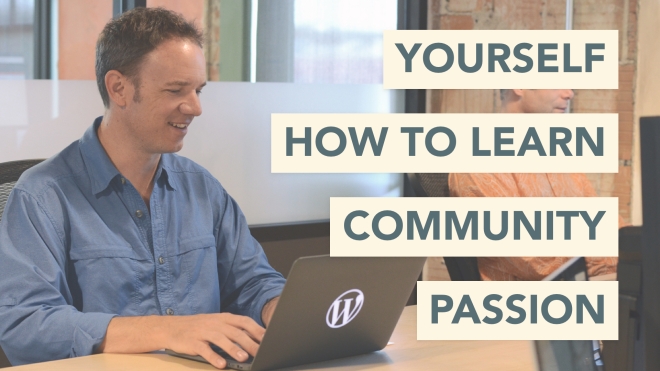
It’s not just about skill, though, right? You’ve got to put one foot in front of the other. Theme craftsmanship could mean a lot of things—I’d like to highlight four areas:
Know yourself: be aware of where you are on the journey to mastery. The next step in your path and how to get there.
Know how to learn: learning opportunities range from playing and being creative to being pragmatic and shipping real products.
Know the community: find a support network of teachers, mentors, and peers to rub elbows with. Share what you know, and give back.
Know your passion: when you care deeply about the work you do, and the people you do it for—I believe you’ll find success. You’ll delighting people and make beautiful things.
Know Yourself
Where do I fit? I sometimes think of my career in themes, at Automattic, as a swimming metaphor. Not sure how I came up with this exactly, but it fits.

First year, 2010: jump into the water, test out my equipment, get a feel for everything. Second year, 2011: master the freestyle stroke, and do lots of laps. Exercising the basic skills over and over. Year three, 2012: add more strokes to my repertoire (butterfly, backstroke), and focus more on the team by being part of a relay. Fourth year, 2013: maybe host an event, and not only race in the meet but also know enough about the sport and its values and rules to be a judge. Year five, 2014: “It’s the Olympics, baby!”
Switching to a new sport in 2015?! Yes, almost as if I got out of the water and on to a bike, I’m learning cycling now. Back to the basics in a new sport.
One thing I learned as part of Theme Team—and participating in default themes in WordPress.org—is that mastery is not just a technical issue. It’s about thinking and mental problems, like motivation and morale, as well as how to learn. Be willing to experiment and be proven wrong. People skills and communication.
In the book Apprenticeship Patterns the authors talk about “Unleashing your enthusiasm” as one of the relatively few responsibilities of the apprentice: excitement, question everything, suggest improvement. As an apprentice—part of self-awareness on my journey my job is to try and surpass my teachers. In that swimming metaphor, you’ll notice the improvement over time in skill and scope.
Mastering is more than just knowing. You are open to improvement. Knowing becomes second nature, and you instead focus on creating, building, and shipping. Being lucky, famous, rich, a genius… none of that matters; it doesn’t make you a master. Skills across your field and the ability to transmit that skill are at the heart of the craft.
As a teacher or mentor: just telling people to do things doesn’t create lasting or sustainable change. When the people you’ve advised encounter a situation that isn’t covered by the rules—say a specific checklist, they’re lost. But yet, if they’ve imbibed the values that underpin the rules, they can come up with new rules to fit any situation. What I sometimes talk about as the investigative mindset. Not having to memorize things, knowing where to look for them. Thinking through problems, not just knowing facts and figures.
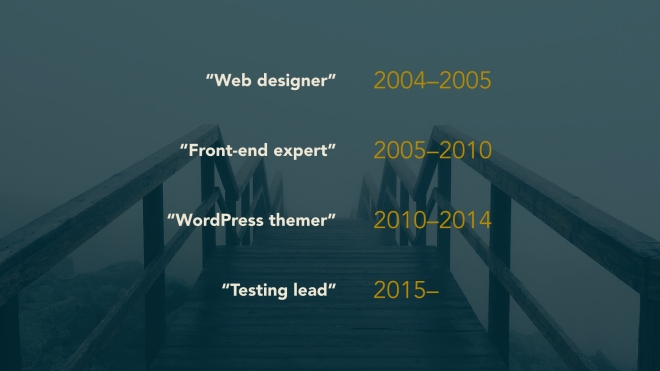
Looking back to when I joined Automattic, the best way to describe it was iron sharpening iron. An example of going from solo entrepreneur, and “front-end expert” on a small team, to Theme Team. Where I was working with the best and the brightest; my peers.
Not only did I grow individually—with technical skills beyond theming like debugging, diff-ing, command line scripts, and automation but also as soft skills investigation, communication, leadership, and customer service—but as the team expanded, it also improved. Win, win.
Things I didn’t know would be part of my job or career when I started.

To know myself, I need to see my current place, then be able to look at the path one, five, ten years ahead, and follow the direction that leads to mastering my chosen craft. Part of that path could be knowing when to switch gears, and start at zero again. Which is of course where I’ve arrived now.
Know How to Learn
Ship it! In WP.org as well as at Automattic there is often pressure from Matt, feature leads, team leads, or our teammates to get a feature or theme out the door. An example I remember vividly is when Steve Jobs died, Matt asked us to come up with a theme to celebrate Steve’s legacy, to go along with a blog post on WordPress.com. It was a tight timeline! A day or two. Matías Ventura—the 3rd Theme Wrangler to join the team after Ian and myself—jumped on it, and within hours had revamped a community theme named Retro MacOS, and we’d launched it on WordPress.com.
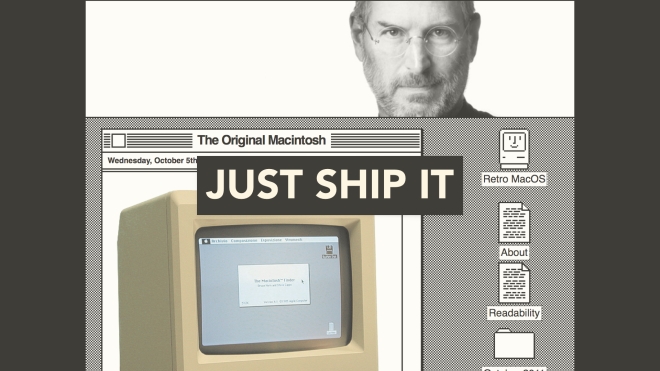
Repeated over and over again, these experiences of getting to v1 as quickly as possible, contributed to my success and taught me a lot about learning by doing. A pattern of pragmatism. When launching my first theme, our trial lead Noël Jackson told me to write the blog post myself, when I was still on trial.
lance: You’re the expert! noel: No, actually—you are. Just jump in. You polished the theme; you’ll do it much better than I can.
That resonated with me. It meant that I can take ownership, learn by doing. He was teaching me by making me do it. Not doing it for me. “Just ship it.” A recurring refrain throughout my career and my journey of craftsmanship.
A sign of a craftsperson is a growth mindset: everything can be improved if we work on it— effort is what makes it, not talent. Try things. Identify an area of ignorance and work to reduce it.
As mentioned in Apprenticeship Patterns, being an apprentice means I value learning over the appearance of smartness, I relish challenge and use errors as routes to mastery. Feeling ignorant on a daily basis means I am growing; I expose my ignorance by asking questions.
Another idea I like is that of “Deliberate practice” from psychologist Anders Ericsson, as described in Susan Cain’s book Quiet, “the best performers I found spent serious time alone studying.” Cain says:
When you practice deliberately, you identify the tasks or knowledge that are just out of your reach, strive to upgrade your performance, monitor your progress, and revise accordingly.
In my journey so far, the most valuable learning opportunities have been building real things. Not books, tutorials, college courses, or conferences. It’s been building new things, and adapting and changing based on feedback from the world around me.
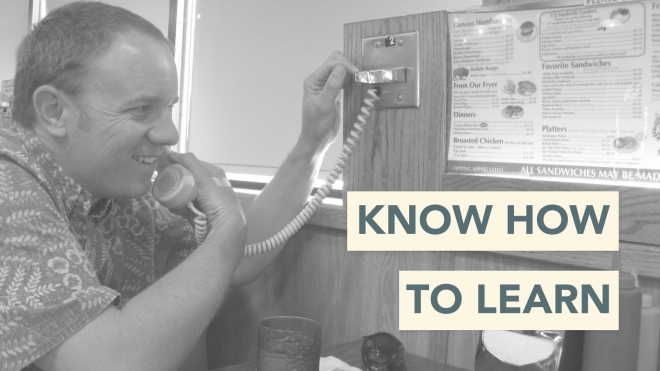
Finding a desire to be pragmatic rather than dogmatic—trade off theoretical purity for getting things done; computer science and theory versus building real products for real people. I’m working on real problems for real people, day in and day out. 300,000 blogs switched to a new theme—we learned quite a lot from that one.
I realized I can learn anything on my own—but it takes a longer time to learn the spirit of something unless I interact with experts. The why behind the how. Community! Iron sharpening iron; just like when joining Automattic. I grew more quickly because of this learning environment.
A story that comes back to me about interacting with experts involves learning shell scripts, in mid-2010. Several coworkers nudged me to jump in to help automate theme tools and scripts to improve our workflow. I found two mentors with Nick and Barry, and we’d chat in IRC, I’d spend time on my own reading other people’s code, and lots of trial and error to get something working. Once we had something launched and running smoothly, I went back to IRC to thank my mentors for their guidance and code reviews.
lance: I'm learning a lot this week bazza: me too
That was a surprise to hear! I learned faster with their help, and it was nice to hear they were also picking up new knowledge and experience. That reminded me that this is a journey of always learning.
Know Your Community

My experience of the themes community came through breakfasts at WCSF and SxSW. Meeting people at WordCamps; helping and getting help from others. Hiring people better than me. Default themes involvement. At Automattic, kicking off with Ian all the way back in Winnipeg—diving in deep, fixing those sites together—many of the folks joining come from the WordPress community.
In this community I found mentors with experts in what I wanted to learn, and added my own individual effort to improve my skills. Then, I shared what I know with my community. If as people we improve our own skills, it’ll improve our teams as well.
Skill isn’t just how much you know about themes, WordPress, web development. Or a workflow. It includes everything it takes to deliver amazing themes. To make amazing websites that delight and help people.
Better to share what you know than to hoard it—the spirit of open source! And a commitment to inclusiveness is part of the journey to knowing your community. Themes involve everything from design, code but also accessibility, i18n, and more. An important aspect of WordPress, the web, and other open source projects. The same DNA. Sharing what we know, part of a bigger community.
I’ve discovered patterns along the way, but chances are, I am not alone in my discovery. Through mentors, talking to my peers—I can share my expectations and findings. Part of the beauty of a community such as WP themes is the rich connections we make with each other. A crucial part of the journey of craftsmanship.
Exposing yourself to the daily working habits of skilled people. There is a lot to be learned by studying the top “high” performers in all disciplines. Rub shoulders with each other. Meet experts and find out where they are in their journey. What can you learn from them?
When you are at a theme conference (or any meetup or group of peers) look around and find at least one new connection. As a practical idea, find someone interested in contributing to an open source project, spend time together on it one evening a week. Fork Picard and make a new JavaScript driven theme, or an Underscores fork with new features. Seek out people who aspire to mastery.
The opposite situation—not taking advantage of the people around you and their skills—can lead to sad results. As explained in the book The Craftsman by Richard Sennett in the story of the Stradivarius workshop, active in Europe in 17th and 18th centuries. “Stradivari—tacit knowledge is not passed to others automatically unless it’s intentional. The secrets died with the masters.” He taught his apprentices, including his two sons, everything he knew. Or, everything he thought was important for them to know. Things were lost. Important details.
The modern equivalent of this could be the quick-hit “tut” culture. Top 10 lists. Just because you can follow the steps doesn’t mean you will understand the meaning behind them. The whys behind the hows.
When you’re talking to your peers, working together—and they say something like “Oh, this is hardly worth mentioning, but…”—it is worth listening because you’ll pick up on those things that might not be as obvious. Things that aren’t in the blog posts, Codex, or tutorials. Things that go beyond just applying basic skills of the craft, coming from intuition and experience.
That’s the reason to not be always isolated, and instead take part in the community.
Know Your Passion
To the extent you can preserve hacking as something you love, you’re likely to do it well. —Paul Graham

My career at Automattic started off with what may be my favorite bug report ever. Not only was it theme ticket #100 but the title was amazingly fatalistic:“Black letterhead fatally flawed.” The description summed it up with, “The theme needs to work.” I replied, “That’s a great mission statement for the theme development team.”
I found my passion when I joined Automattic: building and launching themes and also fixing, automating, building teams and culture, mentoring, and community. Looking critically at my own desires, what I’m good at plus what others’ see and know about me. Asking for feedback. Combine that into a plan: create your journey, where you want to go.
This could apply to anything: theme design and development, leading people, business, or writing.
Rachel Carson [author of Silent Spring] … wrote well because she was a clear thinker and had a passion for her subject. —William Zinsser in On Writing Well
My work should be self-exemplifying. It should reflect my passion, what I care about. That is, it should embody the same principles it espouses. A themer should have a beautiful website, right? For example, Edward Tufte’s books are about clearly displaying data, and they themselves are clearly laid out and explained.
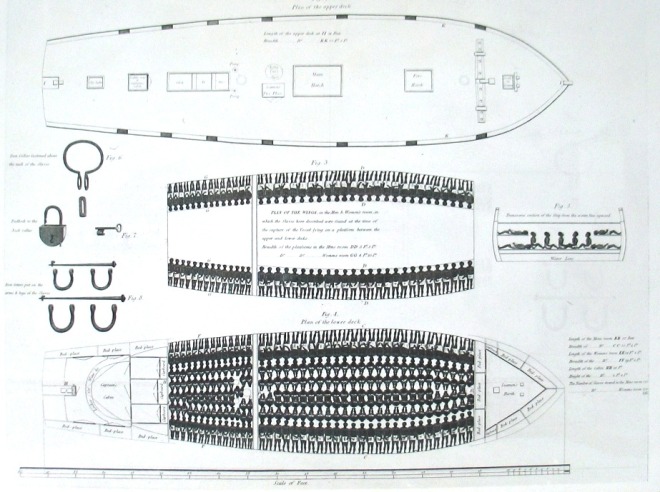
…the engraving is part of document based on first-hand evidence and a deep caring about the content. —Edward Tufte speaking in Beautiful Evidence about an anti-slavery tract published by the London Religious Society of Friends in 1823.
In other words, deeply caring about the content produces wonderful and beautiful results. Whether that involves design, code, WordPress, web standards, or people. Applying that to real situations and real customers can be effective and rewarding.
The craftsman values the 50-line game that makes someone smile over the million-line game that pushes the boundaries of computer science but is unplayable. Working on real problems for real people. —Apprenticeship Patterns
Apply your passion! When we care deeply about the work we do—and the people we do it for—we’ll succeed and our work will delight and help people. That is the purpose of all that we do, helping people.

I’d like to conclude with a question: what’s your passion?
If you keep these values in mind, you’ll know it when you find it, and you’ll be well on your way to mastery on the journey of theme craftsmanship.
As with all matters of the heart, you’ll know it when you find it. —Steve Jobs
Thank you for reading.
This text originally appeared in spoken format for a presentation at ThemeConf (September 2015) titled “A Journey of Theme Craftsmanship.”
See all book notes, quote sources, and photo credits: simpledream.net/craft.



Leave a comment